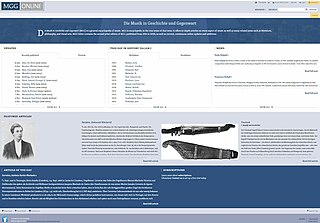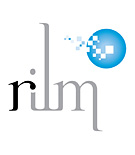
Die Musik in Geschichte und Gegenwart is a German music encyclopedia. It is among the world's most comprehensive encyclopedias of music history and musicology, on account of its scope, content, wealth of research areas, and reference to related subjects. It has appeared in two self-contained printed editions and a continuously updated and expanding digital edition, titled MGG Online.

Répertoire International de Littérature Musicale, commonly known by its acronym RILM, is a nonprofit organization that offers digital collections and advanced tools for locating research on all topics related to music. Its mission is "to make this knowledge accessible to research and performance communities worldwide….to include the music scholarship of all countries, in all languages, and across all disciplinary and cultural boundaries, thereby fostering research in the arts, humanities, sciences, and social sciences." Central to RILM's work and mission is the international bibliography of scholarship relating to all facets of music research.

The Répertoire International des Sources Musicales is an international non-profit organization, founded in Paris in 1952, with the aim of comprehensively documenting extant historical sources of music all over the world. It is the largest organization of its kind and the only entity operating globally to document written musical sources. RISM is one of the four bibliographic projects sponsored by the International Musicological Society and the International Association of Music Libraries, Archives and Documentation Centres, the others being Répertoire International de Littérature Musicale, Répertoire international d'iconographie musicale, and Répertoire international de la presse musicale.
Friedrich Blume was professor of musicology at the University of Kiel from 1938 to 1958. He was a student in Munich, Berlin and Leipzig, and taught in the last two of these for some years before being called to the chair in Kiel. His early studies were on Lutheran church music, including several books on J.S. Bach, but broadened his interests considerably later. Among his prominent works were chief editor of the collected Praetorius edition, and he also edited the important Eulenburg scores of the major Mozart Piano Concertos. From 1949 he was involved in the planning and writing of Die Musik in Geschichte und Gegenwart.
Carl Gregor Herzog zu Mecklenburg was a German historian of music and art. He served as director of the Museum of the Roman Catholic Diocese of Rottenburg-Stuttgart for a period of 18 years, and was noted for his books on music and art. He was a member of the former Mecklenburg ducal family.

The State Institute for Music Research is a musicological research facility in Berlin, Germany for the study of Musical Instruments, Music History, Music Theory and Music technology. It is an agency of the Prussian Cultural Heritage Foundation and operates the Berlin Musical Instrument Museum.

The International Association of Music Libraries, Archives and Documentation Centres (IAML) is an organisation of libraries with music departments, music conservatory libraries, radio and orchestra archives, university institutes, music documentation centers, music publishers, and music dealers that fosters international cooperation and promotes music bibliography and music library science. It was founded in Paris in 1951 and its three official languages are English, German, and French.
Alfred Dörffel was a German pianist, music publisher and librarian.
Christoph-Hellmut Mahling was a German musicologist and lecturer at various universities.

Joseph Maria Müller-Blattau was a German musicologist and National Socialist cultural official. He is regarded as a "nestor of Saarbrücken musicology" but also as a "singer of a musical seizure of power" because of his activities in National Socialism.
Georg von Dadelsen was a German musicologist, who taught at the University of Hamburg and the University of Tübingen. He focused on Johann Sebastian Bach, his family and his environment, and the chronology of his works. As director of the Johann Sebastian Bach Institute in Göttingen, he influenced the Neue Bach-Ausgabe (NBA), the second complete edition of Bach's works.

Harald Heckmann was a German musicologist who focused on source documentation, particularly supported by electronic data processing, and music iconography. Besides teaching at the Musikhochschule Freiburg, he established in 1954 and led until 1971 the German Archive for the History of Music, and afterwards was chairman of the German Broadcasting Archive. He held leading positions of international organisations such as the International Association of Music Libraries, Archives and Documentation Centres (IAML), Répertoire International des Sources Musicales (RISM), and Répertoire International de Littérature Musicale (RILM).
Walther Hermann Vetter was a German musicologist. From 1946 to 1958, he was professor at the Humboldt University of Berlin.
Helmut Schultz was a German musicologist at the University of Leipzig.
Theodor Kroyer was a German musicologist.
Ernst Bücken was a German musicologist and university teacher.
Konrad Sasse was a German musicologist and Handel scholar.
Gotthold Frotscher was a German music historian and musicologist.
Peter Sühring is a German musicologist, publicist and music critic.
Paul Adolf Hirsch was a German industrialist. He was also a musician, bibliophile and musicologist who assembled the largest private music library in Europe. The Hirsch Collection is now housed at the British Library.







